Monks, Rice, War in Laos
Article and photos by Jann Huizenga
For days I pursued young monks over bamboo bridges and into rutted lanes.
Their robes the color of fresh carrots flashed in the sun, magnets for my Canon.
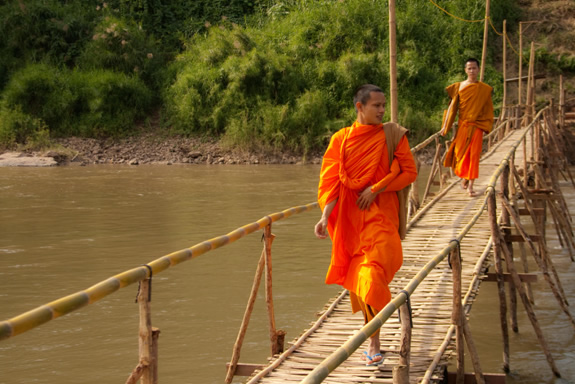
|
|
Monks crossing a bridge in Laos.
|
I snapped them padding along the street in the fuzzy dawn collecting alms, sailing down the mucky Mekong, sweeping streets, hoeing gardens, dozing in courtyards where black moss ate away at the walls.
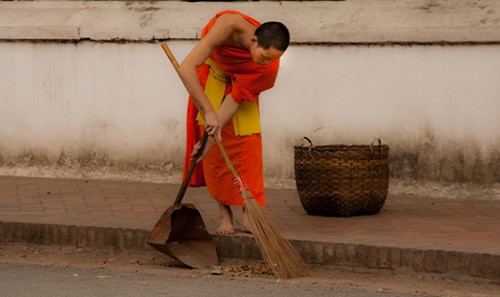
|
|
Monk sweeping the street.
|
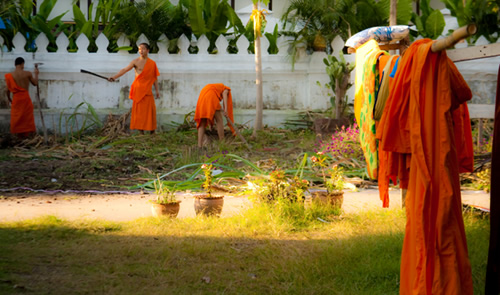
|
|
Monks working in a garden.
|
But, really, what do I know about them, other than the way their robes fan in the hot wind and their skin shines like polished teak?
"Can you teach us English tonight?" asks a novice with an arched eyebrow.
When I show up in the temple courtyard, a man with a milky eye hands me a blue marker pen. There's no teacher this week. Can I take over the two-hour class? And please write out the words to Jingle Bells for him?
The classroom is missing a wall, open to the full moon, malarial mosquitoes, and stray mutts.
"Sabaai-dii!" This greeting is the only Lao word I know.
The monks balance on narrow wood benches in back of the room.
"Can you move up front?"
They break into shy smiles and say they must keep a distance. With newly bald heads — they shave each month at the full moon — they look ageless, like new babes or old men.
Non-monks buzz up on scooters and join the class, kicking off flip-flops before high-stepping over the threshold, so as not to crush the spirits living there. I've kept on my cloth boots to protect my ankles, swollen with bites — the man with the milky eye gave me permission — but everyone else is barefoot.
I drag a bench from behind one of the desks and seat myself. It wobbles a lot, but I fear I may be violating a taboo if I remain standing. This morning at the alms ceremony, I had to kneel to plop sticky rice into monks' bowls.
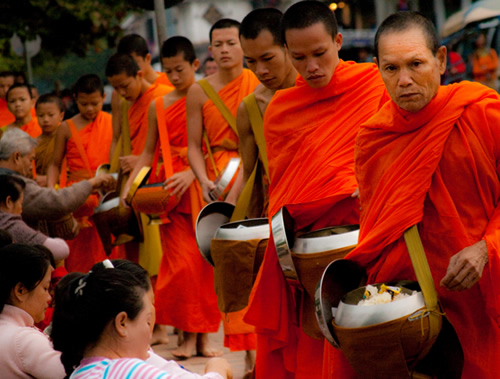
|
|
Monks accepting alms of sticky rice during a ceremony in Laos.
|
Does the same head-below-monk-head rule apply here? The monks laugh at the idea. "Of course you stand! "
Which is good because I really need to write on the board. "Tell two things about yourselves," I say.
"I am sisteen," "I am sewenteen," "I am eighteen." Some are in their twenties. They all have sweet, eager faces. Most come from north Laos. "My village have no road. We have no electricity." The lay students work in factories and shops. Learning English will allow them to move up to better jobs in the budding tourist industry. In the classroom next door, I hear French being taught by a Canadian tourist. From what I can gather, these are the Lao equivalent of adult ed classes.
"Do you want to ask me anything?" I say. They're warmed up now and pepper me with questions about my hometown, husband, age, and impressions of Luang Prabang.
The sun sinks, the air becomes cooler, and I wonder what to do next. The words to the Hokey Pokey are tacked up on a poster on the wall next to the image of a hammer and sickle, so I ask students to stand up and sing. The monks stay put. "We cannot sing," they say, "but we can watch."
"Maybe we shouldn't do this?" I ask.
"No, no, it's OK."
Later I say I don't know Laos. "Teach me about your country."
I'd suck the words back in if I could. But they've already fallen from my lips. Will they say "You bombed us for a decade, every nine minutes on average."
No. They don't talk about bombs falling on small thatched huts or on people with bones thin as bamboo. Nor do they say "We became Communist in spite of your bombs, and nothing happened to you, did it?" Instead they tell about mountains and rivers and caves. The war remains the elephant in the room.
"Please come tomorrow," says an older, spirited monk from the back of the room.
I climb onto a student's scooter. The wind ruffles his spiky hair. A bright moon sails overhead. We shoot past open-air restaurants where tourists pore over fancy menus, then skirt the Night Market, where they bargain for rock-bottom prices. I think how lucky I am that I've escaped their company tonight, though I was one of them last night, and the night before that.
***
I spend the entire next day anticipating the evening. I've been kicking around Asia for three weeks doing museums, markets, cocktails, boat tours, biking, massages, and cooking classes, but volunteering has been the best experience, by far. Later, back home, I'll realize it's the most precious souvenir of my trip. It will transform the way I travel in the future.
The sharp afternoon sun rakes across robes on a bamboo pole outside the classroom.
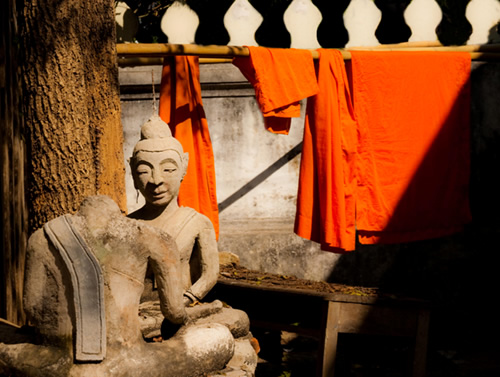
|
|
A Buddha statue in a courtyard..
|
The teacher is still missing. "He marry soon, so maybe in hospital," says a novice.
I don't pursue this logic, but instead introduce Hot Seat, a game played in two teams. Each team sends a teammate to sit in a "hot seat" with his back to the board. I write a word. The class gives clues, and he who guesses the word first wins a point for his team.
It takes students a while to catch on, but when they do, they get surprisingly competitive.
Rice, I write.
"What we eat?"
"Fish?"
"No, no! What we eat every time?"
"Tea?"
"EAT!!!!"
"Rice."
"Please give point!"
Sun, I write.
"What must always have in heart?"
Both contestants cry "Sun!" right off the bat and in unison.
This intrigues me. "Is this a Buddhist idea, always having sun in your heart?" I ask.
"No, teacher!" someone laughs. "Our parents teach this."
Oh. What we could learn from them.
Obama, I write.
The class sits stone silent, eyeing me with puzzlement.
"We do not know this word," says a monk, eyes blinking up at me.
***
The next morning at breakfast, my waiter tells me that, like many young men in Laos, he was a novice for a few years to get an education. His Buddhist training shines from his gentle eyes, which laugh as he says a cell phone tower was installed in his family's village last week. "I can call my mother!" He just got his driver's license in order to pick up hotel guests at the airport. "I had to pay 250 US dollars."
"Why?" That's almost half a year's salary for the average Lao.
"Corruption. Everything in the government is corrupt. You must pay a bribe for everything. Even to become a teacher."
I search the Internet to learn more about where I am. I read that more bombs were dropped on little Laos than were dropped during all of World War II. In the late afternoon, I carry my laptop over the bouncy bamboo bridge so that I can show the class photos that I've shot of their town.
"What are they doing?" I ask, because I really don't know.
"She is eating dragon fruit," they explain, or "She is waiting tuk-tuk," or "She is selling papaya."
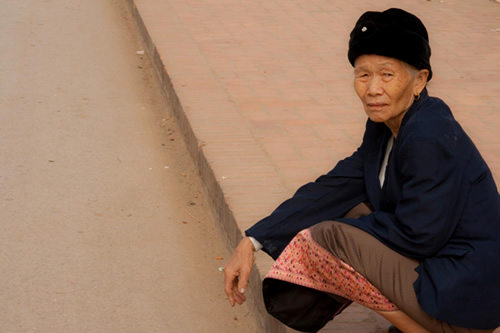
|
|
A woman with an intense gaze.
|
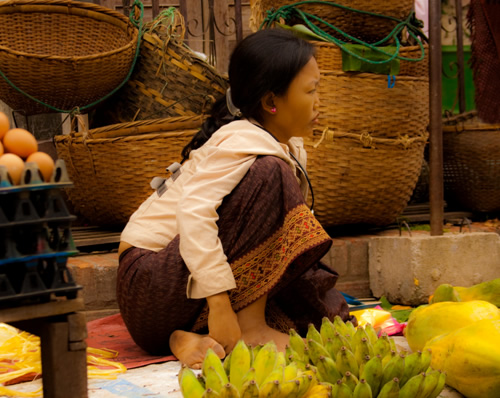
|
|
A child selling fruit.
|
I stumble around the room with my laptop so everyone can see the photos. The floor is a patchwork of jagged blue linoleum pieces that have not been tacked down. One photo shows two women with snow-white hair chatting against sun-drenched blue doors.
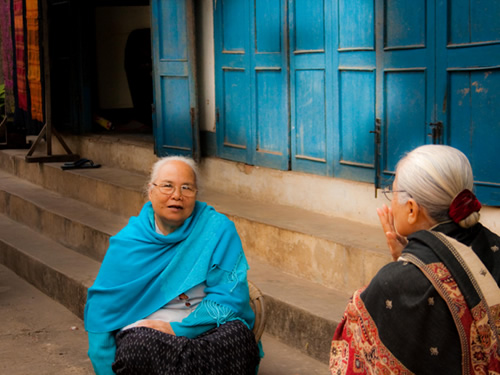
|
|
Women in casual conversation.
|
"What are they doing?"
"Telling stories."
"Oh," I say brightly, "Do you like to tell stories?" I'm hoping someone will regale us with a Lao folktale.
Instead, a novice fixes me with eyes like fire in a dark night. "They telling stories about the war. You know war, teacher?"
The students look at me. I look at them. There's a long moment of unease and sorrow, but it's also one of great connection.
All I can do is nod.
Jann Huizenga is multi-talented. Her books, articles, and photos have appeared in many publications, including anthologies of the Best American Travel Writing and she has taught English worldwide while 20 twenty ESL/EFL textbooks. She has also worked as an ESL consultant conducting workshops for teachers in countries across the globe including Korea, Taiwan, Japan, Italy, and the USA.
|
